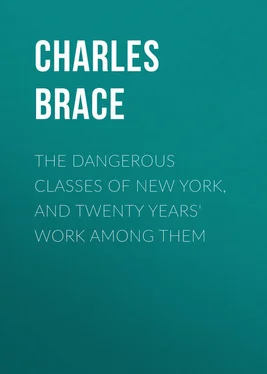Charles Brace - The Dangerous Classes of New York, and Twenty Years' Work Among Them
Здесь есть возможность читать онлайн «Charles Brace - The Dangerous Classes of New York, and Twenty Years' Work Among Them» — ознакомительный отрывок электронной книги совершенно бесплатно, а после прочтения отрывка купить полную версию. В некоторых случаях можно слушать аудио, скачать через торрент в формате fb2 и присутствует краткое содержание. Издательство: Иностранный паблик, Жанр: foreign_antique, foreign_prose, на английском языке. Описание произведения, (предисловие) а так же отзывы посетителей доступны на портале библиотеки ЛибКат.
- Название:The Dangerous Classes of New York, and Twenty Years' Work Among Them
- Автор:
- Издательство:Иностранный паблик
- Жанр:
- Год:неизвестен
- ISBN:нет данных
- Рейтинг книги:5 / 5. Голосов: 1
-
Избранное:Добавить в избранное
- Отзывы:
-
Ваша оценка:
- 100
- 1
- 2
- 3
- 4
- 5
The Dangerous Classes of New York, and Twenty Years' Work Among Them: краткое содержание, описание и аннотация
Предлагаем к чтению аннотацию, описание, краткое содержание или предисловие (зависит от того, что написал сам автор книги «The Dangerous Classes of New York, and Twenty Years' Work Among Them»). Если вы не нашли необходимую информацию о книге — напишите в комментариях, мы постараемся отыскать её.
The Dangerous Classes of New York, and Twenty Years' Work Among Them — читать онлайн ознакомительный отрывок
Ниже представлен текст книги, разбитый по страницам. Система сохранения места последней прочитанной страницы, позволяет с удобством читать онлайн бесплатно книгу «The Dangerous Classes of New York, and Twenty Years' Work Among Them», без необходимости каждый раз заново искать на чём Вы остановились. Поставьте закладку, и сможете в любой момент перейти на страницу, на которой закончили чтение.
Интервал:
Закладка:
This crime, with the girl, seems to sap and rot the whole nature. She loses self-respect, without which every human being soon sinks to the lowest depths; she loses the habit of industry, and cannot be taught to work. Having won her food at the table of Nature by unnatural means, Nature seems to cast her out, and henceforth she cannot labor. Living in a state of unnatural excitement, often worked up to a high pitch of nervous tension by stimulants, becoming weak in body and mind, her character loses fixedness of purpose and tenacity and true energy. The diabolical women who support and plunder her, the vile society she keeps, the literature she reads, the business she has chosen or fallen into, serve continually more and more to degrade and defile her. If, in a moment of remorse, she flee away and take honest work, her weakness and bad habits follow her; she is inefficient, careless, unsteady, and lazy; she craves the stimulus and hollow gayety of the wild life she has led; her ill name dogs her; all the wicked have an instinct of her former evil courses; the world and herself are against reform, and, unless she chance to have a higher moral nature or stronger will than most of her class, or unless Religion should touch even her polluted soul, she soon falls back, and gives one more sad illustration of the immense difficulty of a fallen woman rising again.
The great majority of prostitutes, it must be remembered, have had no romantic or sensational history, though they always affect this. They usually relate, and perhaps even imagine, that they have been seduced from the paths of virtue suddenly and by the wiles of some heartless seducer. Often they describe themselves as belonging to some virtuous, respectable, and even wealthy family. Their real history, however, is much more commonplace and matter-of-fact. They have been poor women's daughters, and did not want to work as their mothers did; or they have grown up in a tenement-room, crowded with boys and men, and lost purity before they knew what it was; or they have liked gay company, and have had no good influences around them, and sought pleasure in criminal indulgences; or they have been street-children, poor, neglected, and ignorant, and thus naturally and inevitably have become depraved women. Their sad life and debased character are the natural outgrowth of poverty, ignorance, and laziness. The number among them who have "seen better days," or have fallen from heights of virtue, is incredibly small. They show what fruits neglect in childhood, and want of education and of the habit of labor, and the absence of pure examples, will inevitably bear. Yet in their low estate they always show some of the divine qualities of their sex. The physicians in the Blackwell's Island Hospital say that there are no nurses so tender and devoted to the sick and dying as these girls. And the honesty of their dealings with the washerwomen and shopkeepers, who trust them while in their vile houses, has often been noted.
The words of sympathy and religion always touch their hearts, though the effect passes like the April cloud. On a broad scale, probably no remedy that man could apply would ever cure this fatal disease of society. It may, however, be diminished in its ravages, and prevented in a large measure. The check to its devastations in a laboring or poor class will be the facility of marriage, the opening of new channels of female work, but, above all, the influences of education and Religion.
An incident occurred daring our early labors, which is worth preserving:
"Mrs. Forster, the excellent Matron of the Female Department of the prison, had told us of an interesting young German girl, committed for vagrancy, who might just at this crisis be rescued. I entered these soiled and gloomy Egyptian archways, so appropriate and so depressing, that the sight of the low columns and lotus capitals is to me now inevitably associated with the somber and miserable histories of the place.
"After a short waiting, the girl was brought in – a German girl, apparently about fourteen, very thinly but neatly dressed, of slight figure, and a face intelligent and old for her years, the eye passionate and shrewd. I give details because the conversation which followed was remarkable.
"The poor feel, but they can seldom speak. The story she told, with a wonderful eloquence, thrilled to all our hearts; it seemed to us, then, like the first articulate voice from the great poor class of the city.
"Her eye had a hard look at first, but softened when I spoke to her in her own language.
"'Have you been long here?'
"'Only two days, sir.'
"Why are you here?'
"'I will tell you, sir. I was working out with a lady. I had to get up early and go to bed late, and I never had rest. She worked me always; and, finally, because I could not do everything, she beat me – she beat me like a dog, and I ran away; I could not bear it.'
"The manner of this was wonderfully passionate and eloquent.
"'But I thought you were arrested for being near a place of bad character,' said I.
"'I am going to tell you, sir. The next day I and my father went to get some clothes I left there, and the lady wouldn't give them up; and what could we do? What can the poor do? My father is a poor old man, who picks rags in the streets, and I have never picked rags yet. He said, "I don't want you to be a rag-picker. You are not a child now – people will look at you – you will come to harm." And I said, "No, father, I will help you. We must do something now, I am out of place;" and so I went out. I picked all day, and didn't make much, and I was cold and hungry. Towards night, a gentleman met me – a very fine, well-dressed gentleman, an American, and he said, "Will you go home with me!" and I said, "No." He said, "I will give you twenty shillings," and I told him I would go. And the next morning I was taken up outside by the officer.'
"'Poor girl!' said some one, 'had you forgotten your mother? and what a sin it was!'
"'No, sir, I did remember her. She had no clothes, and I had no shoes; and I have only this (she shivered in her thin dress), and winter is coming on. I know what making money is, sir. I am only fourteen, but I am old enough. I have had to take care of myself ever since I was ten years old, and I have never had a cent given me. It may be a sin, sir (and the tears rained down her cheeks, which she did not try to wipe away). I do not ask you to forgive it. Men can't forgive, but God will forgive. I know about men.
"'The rich do such things and worse, and no one says anything against them. But I, sir — I am poor! (This she said with a tone which struck the very heart-strings.) I have never had any one to take care of me. Many is the day I have gone hungry from morning till night, because I did not dare spend a cent or two, the only ones I had. Oh, I have wished sometimes so to die! Why does not God kill me!'
"She was choked by her sobs. We let her calm herself a moment, and then told her our plan of finding her a good home, where she could make an honest living. She was mistrustful. 'I will tell you, mein Herren; I know men, and I do not believe any one, I have been cheated so often. There is no trust in any one. I am not a child. I have lived as long as people twice as old.'
"'But you do not wish to stay in prison?'
"'O God, no! Oh, there is such a weight on my heart here. There is nothing but bad to learn in prison. These dirty Irish girls! I would kill myself if I had to stay here. Why was I ever born? I have such Kummerniss (woes) here (she pressed her hand on her heart) – I am poor!'
"We explained our plan more at length, and she became satisfied. We wished her to be bound to stay some years.
"'No,' said she, passionately, 'I cannot; I confess to you, gentlemen. I should either run away or die, if I was bound.'
Читать дальшеИнтервал:
Закладка:
Похожие книги на «The Dangerous Classes of New York, and Twenty Years' Work Among Them»
Представляем Вашему вниманию похожие книги на «The Dangerous Classes of New York, and Twenty Years' Work Among Them» списком для выбора. Мы отобрали схожую по названию и смыслу литературу в надежде предоставить читателям больше вариантов отыскать новые, интересные, ещё непрочитанные произведения.
Обсуждение, отзывы о книге «The Dangerous Classes of New York, and Twenty Years' Work Among Them» и просто собственные мнения читателей. Оставьте ваши комментарии, напишите, что Вы думаете о произведении, его смысле или главных героях. Укажите что конкретно понравилось, а что нет, и почему Вы так считаете.












